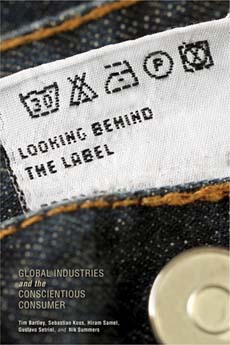|
English Summary/英文概要:
What does it mean when consumers “shop with a conscience” and choose products labeled as fair or sustainable? Does this translate into meaningful changes in global production processes? To what extent are voluntary standards implemented and enforced, and can they really govern global industries? Looking behind the Label presents an informative introduction to global production and ethical consumption, tracing the links between consumers’ choices and the practices of multinational producers and retailers. Case studies of several types of products—wood and paper, food, apparel and footwear, and electronics—are used to reveal what lies behind voluntary rules and to critique predominant assumptions about ethical consumption as a form of political expression.
Table of Contents
Acknowledgments
List of Commonly Used Acronyms
Introduction: Rules, Responsibilities, and Rights in the Global Economy
Part I: Making Sense of Conscientious Consumerism
1. The Making of Conscientious Consumers: Individual and National Patterns
2. Dilemmas of Conscientious Consumerism
Part II: Behind the Label: Global Production and the Meaning of Standards
3. Wood and Paper Products: Searching for Sustainability
4. Food: Global Agriculture and Local Development
5. Apparel and Footwear: Standards for Sweatshops
6. Electronics: The Hidden Costs of Computing
Conclusion: Beyond Conscientious Consumerism
Appendix
Notes
References
Index
Awards/获奖情况: "This is an outstanding book that analyzes the complexities of the ’conscientious consumer’ movement in several global industries. The authors do an excellent job of outlining the debates surrounding efforts to promote decent labor and environmental conditions through various initiatives aimed at promoting ethical consumption and then illustrate the difficulties in implementing these schemes across different industries (apparel, footwear, food, wood and paper, and electronics industries) and nations. This book nicely blends theory with rich empirical evidence and case studies in ways that are easily accessible to all readers interested in learning more about conscientious consumerism. This is a must read for anyone interested in promoting social and environmental justice in today’s world." —Richard M. Locke, Watson Institute, Brown University
"These authors convincingly demonstrate that efforts to address the labor and environmental implications of contemporary production processes are complex. By going ’behind the label’ of everyday items such as smart phones and sweatshirts, the authors grapple with the tensions between claims for ethical production, the realities of complex global industries, and the frequently competing interests of the diverse constituencies seeking to shape these supply chains. Above all, they deliver a sober and clear-eyed defense of conscientious consumption as one element in a broader strategy for pursuing a more just and sustainable global economy." —Jennifer Bair, University of Colorado at Boulder
"This book advances our understanding of the new dynamics of social regulation in the global economy, analyzing both the rise of new consumption patterns through ethical purchasing, boycotts, and buycotts and the emergence of eco and social certification systems shaping the production of key commodities like timber, food, apparel, and electronics." —Laura T. Raynolds, Colorado State University
"Ultimately, the book moves readers away from individualistic stances on saving the world through buying ’socially responsible’ products, to a much more critical sociological perspective by forcing us to look at how our political and economic structures can be the deepest source of international human rights violations and environmental degradation." —Mobilizing Ideas
|
|
|
About the Author/作者介绍: Tim Bartley is Associate Professor of Sociology at The Ohio State University. He is co-editor of Regulation & Governance, an interdisciplinary, international journal focused on the past and present of industry regulation and the changing character of governance within and across countries.
Sebastian Koos is Assistant Professor of Corporate Social Responsibility, Department of Politics and Public Administration, University of Konstanz
Hiram Samel is Associate Professor of International Business, Saïd Business School, University of Oxford.
Gustavo Setrini is Assistant Professor of Food Studies at New York University.
Nik Summers is a PhD candidate in Sociology at Indiana University. |

